Mountain man: Former App State coach Jerry Moore on life, football and the Michigan upset
In North Carolina’s mountains, a football coach named Jerry Moore led Appalachian State to new heights two decades ago.
Now 84, Moore coached the Mountaineers from 1989-2012 and built a dynasty. In 2005, 2006 and 2007, he directed the Mountaineers all the way to the top of the mountain, winning three straight national titles at the FCS level. Those were the first three NCAA football championships any institution from the state of North Carolina had won, at any level.
Moore also coached the Mountaineers to arguably the most famous upset in college football history — a 34-32 win against No. 5 Michigan, in the 2007 season opener. Moore earned his way into the College Football Hall of Fame in 2014.
In this interview, Moore talked about all of those championships, the brilliance of quarterback Armanti Edwards and the chaotic upset in Ann Arbor. He also spoke honestly about making peace with his difficult departure from Appalachian State after the 2012 season and why he again fully embraces the program today. This interview has been edited for clarity and brevity and can be found in longer form on the “Sports Legends of the Carolinas” podcast.
Scott Fowler: I know you’re from Texas. How long have you been in Boone?
Jerry Moore: Well, I was an assistant coach at Arkansas in ‘88. And Jim Garner was the athletic director here. And Jim called me and one thing led to another and I met Dr. (John E.) Thomas, the chancellor. And I just saw it as a great opportunity. I didn’t know we’d be here this long. We kind of fell in love with the people here. Mountain people.
SF: Before that, how and where did you grow up?
JM: I grew up in Bonham, Texas, home of Sam Rayburn, speaker of the house. When I was a freshman in high school, we were 0-10 (as a football team). We celebrated if we won the coin toss. We were terrible.
And then the next three years we only lost five games and two of those were in the playoffs. We had a terrific high school coaching staff. One was my Sunday school teacher and one was the best football coach I’ve ever been around.
I chose Baylor (for college). I was a receiver. We went to the Gator Bowl our senior year. We were good. Several of us got opportunities in the NFL. Not very many of us made it, but we had the opportunity. And that’s where I met Margaret (Moore’s wife of 60-plus years).
We met when we were freshmen and we dated for three years and got married. And we played a lot of tennis. That was our entertainment. Then from there, I got cut by the Dallas Cowboys.
SF: How’d you get started in coaching?
JM: My high school coach called me and asked me to come coach for him at Corsicana High School. And Margaret taught elementary school across the street from the high school. The third year there at Corsicana, which is 50 miles south of Dallas, we were the only undefeated team in the state of Texas. We had a terrific football team.
And then I went to SMU for seven years (under head coach Hayden Fry). ... Tom Osborne asked if I’d be interested in coming to Nebraska, and I went there for seven years. Then I came back to Texas as the head coach at North Texas State University. And we were there for two years and were 11-11. From there, to Texas Tech (as a head coach in the old Southwest Conference). That was a tough time for me. We never had a winning season.
(After getting fired), I was out of coaching for 16 months. Then I went to Arkansas, to be a volunteer coach under Ken Hatfield. The pieces began to fit together. Garner (the Appalachian State AD) called me and offered me the job on the phone. I had never been to Boone.
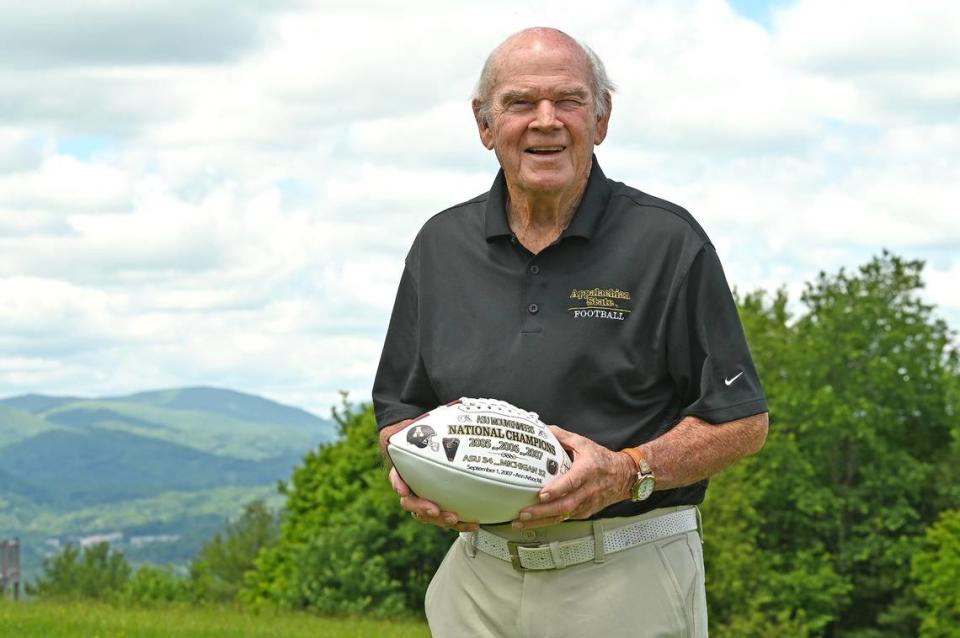
SF: What did you look for when recruiting a potential App State player?
JM: (Laughs) Now I’m not an App State guy. I’m an Appalachian State guy. They took me in a room after they hired me here and made me learn how to pronounce “Appalachian State.”
SF: OK, what did you look for in an Appalachian State player?
JM: The first thing is that they wanted to come to Appalachian State. We worked hard. We had high goals. You hear people talk about family? We were a family.
The first national title
SF: You won your very first national championship in 2005, in the pre-Armanti Edwards area. Tell me about that game in Chattanooga, Tenn., against Northern Iowa in the final.
JM: We had great preparation, but the problem was that our quarterback Richie Williams was hurt. Trey Elder was our backup quarterback.
Trey did OK in the first half but we were behind and it looked like that if Richie had been well, we would have been in good shape. And so I remember walking off the field at halftime and I said, “We’ll go with Richie in the second half. We’ve just got to protect him. He can’t get hit.”
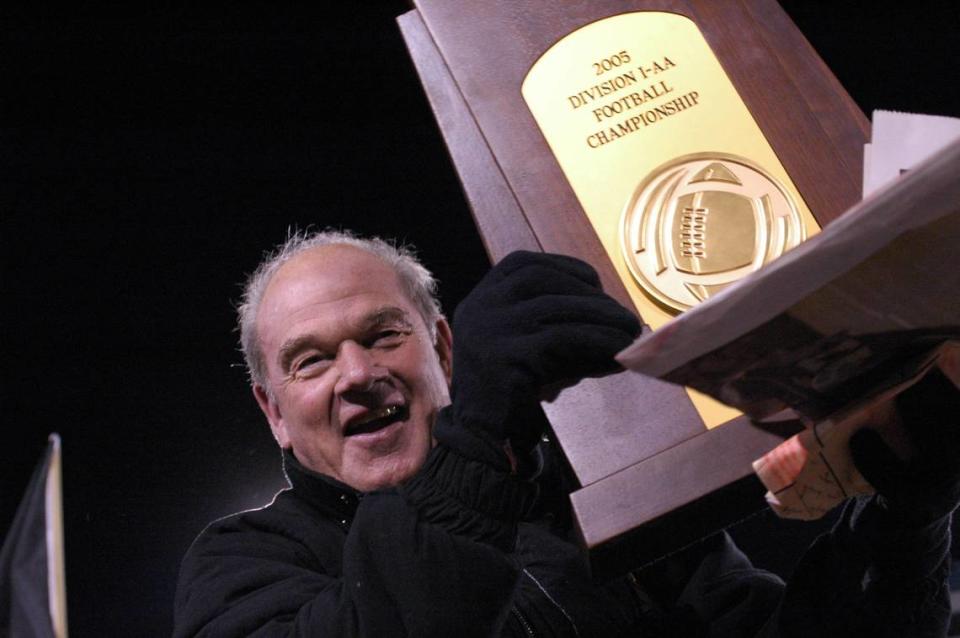
And early in the third quarter, we had a third-down play where he completed a long pass, and Richie had to go down the field to get in the huddle. He was hobbling. He was limping. And our fans went wild.
SF: Then the next two years, you won back-to-back national championships with Edwards as the QB. I imagine when you recruited him you didn’t know what you were getting?
JM: Well, I don’t think anybody does, as far as college coaches. You see the potential in them, and you never know what they’re gonna do. I had a terrific home visit with Armanti and his Mom. I could have stayed there all night.
Some larger schools were interested in Armanti, but as a defensive back. He was also a receiver (in high school) and just a terrific athlete.
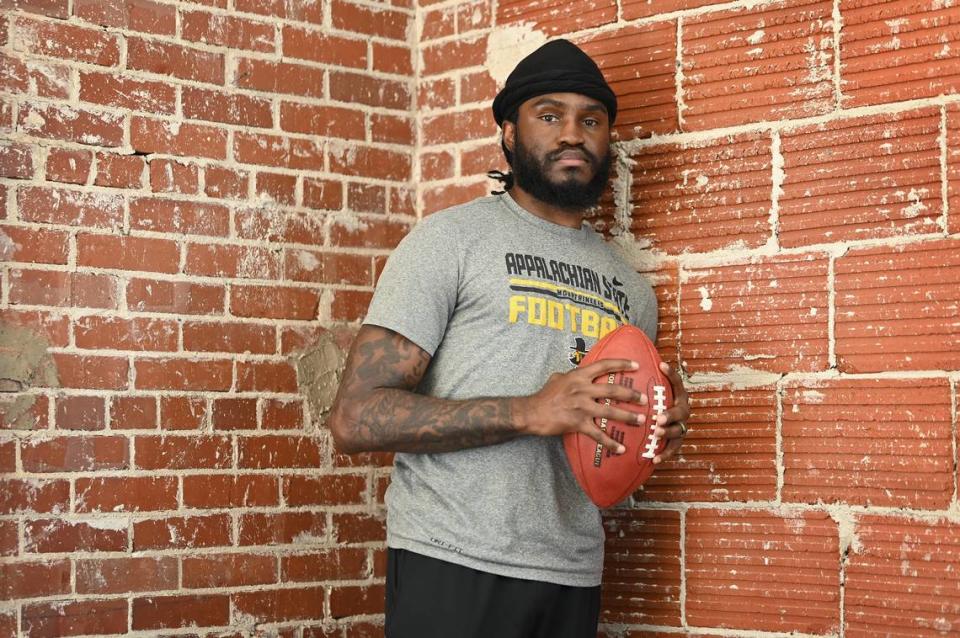
And to tell you the truth, we didn’t see that much difference between him and CoCo Hillary. I was right up front with both of them. I said, “During two-a-days, we’re gonna work both of you as quarterback, but one of you is gonna be a quarterback and one of you is gonna be a receiver.” And they bought into it. CoCo was also a great player for us and made a huge play in the win over Michigan.
Armanti? He’s always been very quiet. His leadership came when he had the ball. In games, I’ve seen him take hits, right in the face, and deliver the ball.
Probably the worst thing people could do is flush him out of the pocket. If he’s got the ball in his hands running, he’s double trouble.
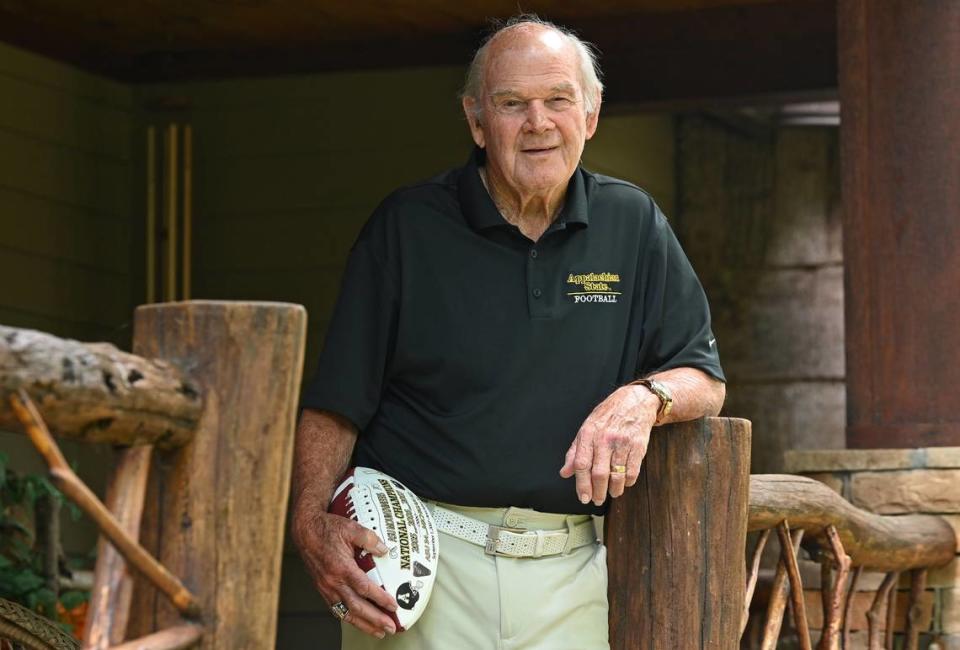
The upset at Michigan
SF: Armanti was the quarterback, of course, for your famous upset win over Michigan in 2007. How did that game get set up, anyway?
JM: (In early 2007), Jay Sutton (an assistant athletic director) kind of pecked on the door and said, “Coach, Michigan just called. They want to play us.”
I said, “Jay, I don’t care what it takes. Don’t worry about money. We will never get this opportunity again. Tell them yes.” Probably somebody had opted out and they had to fill (the scheduling slot) with somebody. We had been a small school of notoriety that they could play and justify.
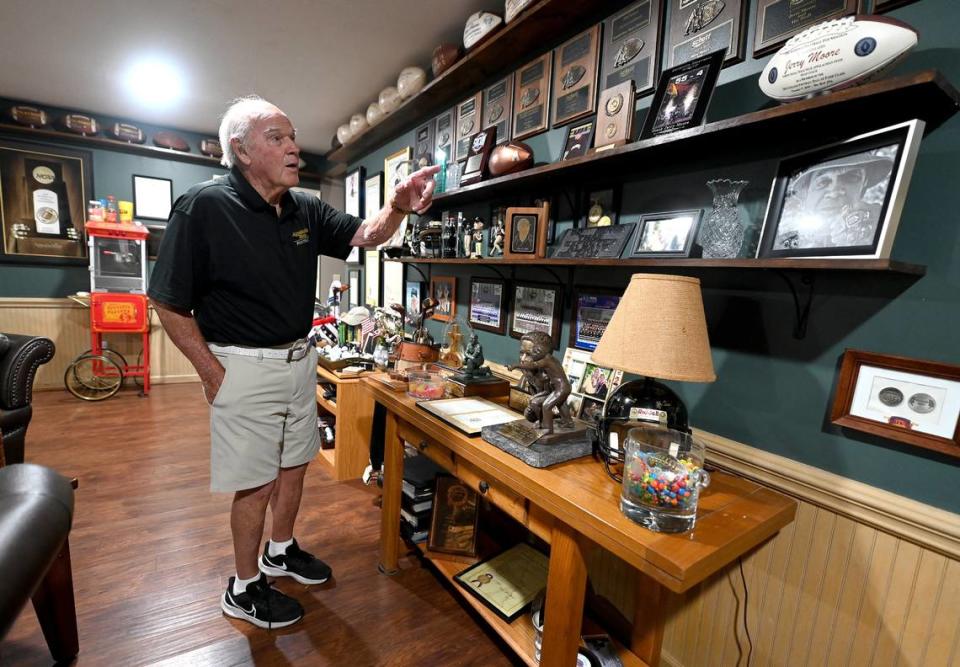
SF: You arrived one day before the game in Michigan. How did you handle your players, knowing that 109,000 people were going to be in the stands in the “Big House” at Ann Arbor the next day?
JM: First, I gave them about 45 minutes where they could go anywhere in the stadium. Just milling around. They didn’t go in the Michigan locker room, but they went by it. And I went in the Michigan equipment room because the Michigan equipment man invited me in. I walked out and he gave me a couple of hats. They’re still hanging in my office.
I didn’t want them to be in awe. But our guys — they had won two national championships. They had played in big games. We were really well-prepared.
SF: And a lot faster than Michigan, it turned out.
JM: We were quick. We had an early speed throw to (Dexter Jackson) and they tried to run him down and just couldn’t.

SF: Do you think Michigan took you lightly because, after all, you were little Appalachian State?
JM: Probably to some degree, I think they did. And then most instances in sports, that’s the worst thing you can do. It’s hard to get ready at halftime. A coach can go in there and holler, scream, grab one or two of them and all that. Most of the time, it’s too late.
SF: That was such a topsy-turvy game. You kicked a late field goal to go ahead, 34-32, but then Michigan had a great last-second throw down the field and set up for a potential winning field goal. Did you think then: “Oh my gosh, we’ve done all this work but Michigan is gonna end up winning?”
JM: Not really. And it wasn’t because of me, it was because of what was happening behind me. I had my arms crossed and all that stuff.
But behind me I could hear an echo: “We’ll block it. We’ll block it.” Just like an echo in the valley. We had seen it in practice, over and over. And sure enough, Corey (Lynch) blocks it.
SF: What was the reaction after that?
JM: Chaos. And I’ve been asked this before, but Lloyd Carr (Michigan’s head coach) — I didn’t get a chance to see him after the game. But he did call me on Sunday. And I wish it had been in the staff meeting so we could have put it on the (speaker phone), because it was a great call. A classy call.
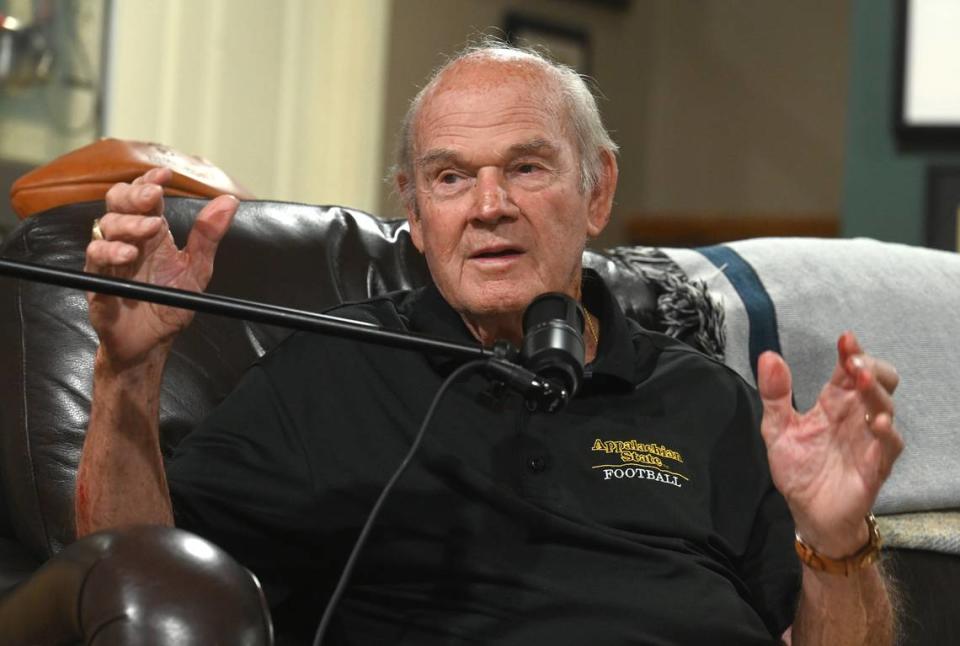
Leaving Appalachian State
SF: You were 215-87 at Appalachian State and won a Southern Conference title even in your final season. But after the 2012 season, they didn’t ask you back for another year, and you wanted to coach in 2013, right?
JM: Yeah. I wasn’t ready to quit.
SF: Does that still rankle you at this point?
JM: Oh yeah. I’ll never forget that. (Appalachian State’s then-AD) Charlie Cobb called me Sunday morning (the day before, Appalachian State had lost a playoff game after getting an extra point blocked). We were on our way to the car to go to church. And he said we need to meet.
I said. “Well, can we wait until one o’clock?” He said, “No, we need to meet right now.” And so I took Margaret to church.... And I went to see Charlie and Rick Beasley (an assistant Appalachian State AD) was with him. ... And I remember Rick saying, “They don’t want to use the word ‘fired.’ They want you gone.”

And this was the end of the conversation. And I went back to get Margaret. And I said: “Can you go to Sunday School?” And she said, “Yeah, we’ll go.” So we went to Sunday School, but we weren’t in there five minutes and she started crying. ...
I’ve never said this publicly. And I don’t expect anything that bad to come out of it. But it’s been personal for sure. ... It just wasn’t the right way to end it.
SF: They put it out as if it was a mutual decision, right? Because they didn’t want to use the word “fired” — but in reality that’s kind of what happened?
JM: Yeah.
SF: How long did it take you to get over that?
JM: I never went back up there. Not until all those (administrative) people were gone. ... I didn’t go up there for a couple of years.
And it was hard, because that was (the players we had recruited). The good thing about it was that it was (Scott) Satterfield (who replaced Moore), and his wife Beth. They didn’t have anything to do with (not retaining Moore). It was a great opportunity for them. I’m as close to them today as I was when he came in here as a walk-on recruit.
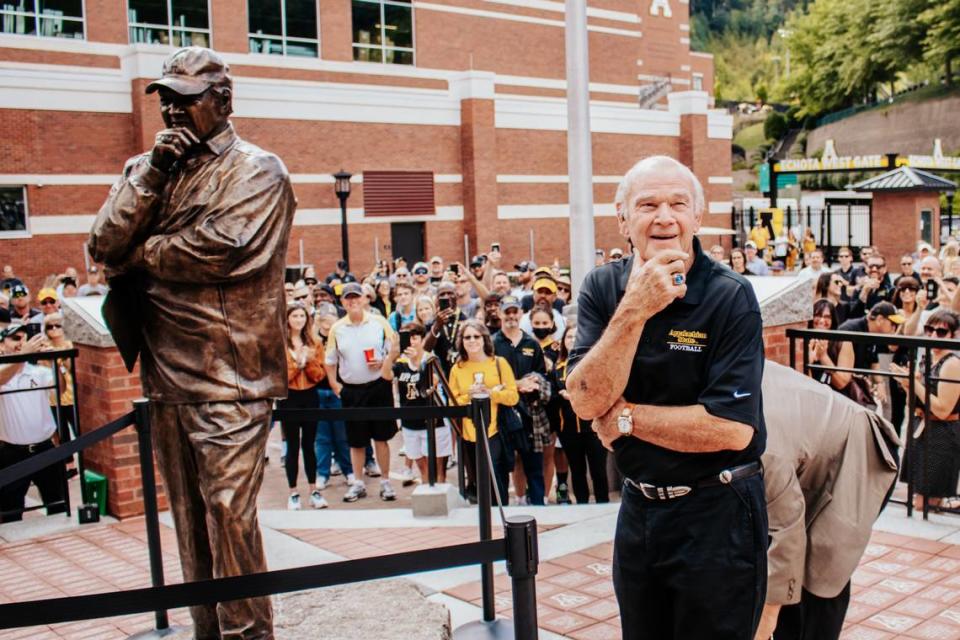
SF: Do you go to Appalachian State games now? There’s a statue of you at the stadium.
JM: I do. Most all the home games. The people — we could have won a national championship every year and they couldn’t have been any better. ... We’ve tried to be ourselves and put that behind us. There’s probably not a nice way to get rid of people.
SF: What do you do now to keep yourself busy?
JM: I love to play golf. And I’m not very good. ... And I speak a good bit. I’m not very good at that either. And I like to work in the yard. If you guys weren’t here, I’d be painting the deck.
SF: You must be in really good health.
JM: Well I think I am. I hope I am. But we just are a typical family. And I get disappointed and have a pity party every once in a while.
But it turned out good. We’ve got some great friends here that we’re close to, that we see almost weekly, and not just here in Boone. ... I keep saying we’ve been blessed. And all this other stuff overshadows that day. ... It’s been really good.
The national award-winning “Sports Legends” series includes 1-on-1 interviews with guests like Richard Petty, Steph Curry, Roy Williams, Mike Krzyzewski, Jake Delhomme, Armanti Edwards, Alonzo Mourning and Dawn Staley. Those are also available on the “Sports Legends of the Carolinas” podcast, where a fuller version of this Jerry Moore interview can also be found.
The “Sports Legends” coffee-table book is now available at SportsLegendsBook.com and at local bookstores.


 Yahoo Sports
Yahoo Sports 
